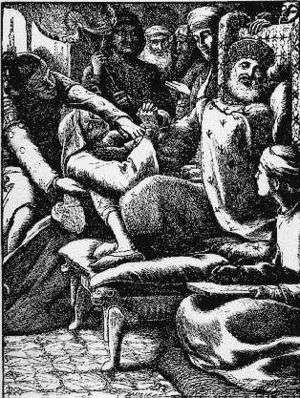Luke 18
| Luke 18 | |
|---|---|
|
Luke 6:4-16 on Papyrus 4, written about AD 150-175. | |
| Book | Gospel of Luke |
| Bible part | New Testament |
| Order in the Bible part | 3 |
| Category | Gospel |
Luke 18 is the eighteenth chapter of the Gospel of Luke in the New Testament of the Christian Bible. It records the teachings and a miracle of Jesus Christ.[1] The book containing this chapter is anonymous but early Christian tradition uniformly affirmed that Luke composed this Gospel as well as Acts.[2]
Text
- The original text is written in Koine Greek.
- Some most ancient manuscripts containing this chapter are:
- Papyrus 75 (written about AD 175-225)
- Codex Vaticanus (AD 325-350)
- Codex Sinaiticus (AD 330-360)
- Codex Bezae (ca. AD 400)
- Codex Washingtonianus (ca. AD 400)
- Codex Alexandrinus (ca. AD 400-440)
- This chapter is divided into 43 verses.
Structure
This chapter can be grouped (with cross references to other parts of the Bible):
- Luke 18:1-8 = Parable of the Persistent Widow
- Luke 18:9-14 = Parable of the Pharisee and the Tax Collector
- Luke 18:15-17 = Jesus Blesses Little Children (Matthew 19:13-15; Mark 10:13-16)
- Luke 18:18-25 = Jesus Counsels the Rich Young Ruler (Matthew 19:16-26; Mark 10:17-27)
- Luke 18:26-30 = With God All Things Are Possible (Matthew 19:27-30; Mark 10:28-31)
- Luke 18:31-34 = Jesus a Third Time Predicts His Death and Resurrection (Matthew 20:17-19; Mark 10:32-34)
- Luke 18:35-43 = A Blind Man Receives His Sight (Matthew 20:29-34; Mark 10:46-52)
Parable of the Persistent Widow

This parable is also known as the Parable of the Unjust Judge or the Parable of the Importunate Widow appears only in one of the Canonical gospels of the New Testament, namely the Gospel of Luke. It tells about a judge (who is both atheistic and lacking compassion) who is repeatedly approached by a poor widow, seeking justice. Initially rejecting her demands, he eventually honors her request so he won't be worn out by her persistence. This parable demonstrates the importance of persistence in prayer, never giving up. It is found immediately prior to the parable of the Pharisee and the Publican (also on prayer) and is similar in to the parable of the Friend at Night.
A Blind Man Receives His Sight
Each of the three synoptic gospels tells of Jesus healing the blind near Jericho, as he passed through that town, shortly before his passion. Mark 10:46-52 tells only of a man named Bartimaeus (literally "Son of Timaeus") being present, as Jesus left Jericho, making him one of the few named people to be miraculously cured by Jesus. Matthew 20:29-34 is a similar account of two blind men being healed outside of Jericho, but gives no names. Luke 18:35-43 tells of one unnamed blind man, but seems to place the event instead as when Jesus approached Jericho.
These men together would be the second of two healings of blind men on Jesus' journey from the start of his travels from Bethsaida (in Mark 8:22-26) to Jerusalem, via Jericho.[3] It is possible, though not certain, that Bartimaeus heard about the first healing, and so knew of Jesus' reputation.[4]
See also
- Jericho
- Ministry of Jesus
- Miracles of Jesus
- Parables of Jesus
- Other related Bible parts: Matthew 19, Matthew 20, Mark 10
References
- ↑ Halley, Henry H. Halley's Bible Handbook: an abbreviated Bible commentary. 23rd edition. Zondervan Publishing House. 1962.
- ↑ Holman Illustrated Bible Handbook. Holman Bible Publishers, Nashville, Tennessee. 2012.
- ↑ "Reflections: The blind Bartimaeus: Mark 10:46-52," October 24, 2009, The Manila Bulletin, The Manila Bulletin website, citing365 Days with the Lord, (St. Paul's, Makati City, Philippines) from St. Paul's website (dead link). Accessed October 28, 2009.
- ↑ Phyllis Kersten, "What Bartimaeus wanted: Mark 10:46-52," Christian Century, October 20, 2009, found at Christian Century website. Accessed October 28, 2009.
External links
| Preceded by Luke 17 |
Chapters of the Bible Gospel of Luke |
Succeeded by Luke 19 |
.jpg)